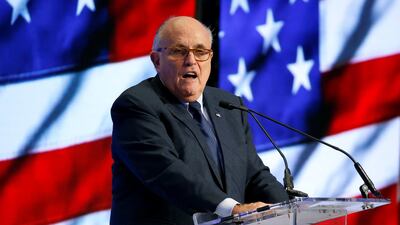The storm over Rudy Giuliani's comments last weekend that "truth isn't truth" are a reminder of the dispiriting sense that we are all suffering from "truth decay". That's the phrase used by the highly respected Rand Corporation to account for a world in which lying and deceit have become normalised.
It is so pervasive that, as Pope Francis reminded us, “there is no such thing as harmless disinformation; trusting in falsehood can have dire consequences”.
Among those dire consequences is an erosion of trust in governments, the media and democracy itself. Hence the US president's lawyer had no qualms about telling an incredulous Chuck Todd on Meet the Press, in response to questions about why Donald Trump might not testify to special counsel Robert Mueller, that "when you tell me [he] should testify because he's going to tell the truth and he shouldn't worry, that's so silly because it's somebody's version of the truth, not the truth...truth isn't truth."
In her brilliant new book The Death of Truth, the New York Times writer Michiko Kakutani analyses what has gone wrong and what we need to do to put it right and limit the damage caused by truth decay. Ms Kakutani begins with the implications of a world in which the president of the United States lies so often that US newspapers claim to have found several thousand lies – and he is not even halfway through his term. But America is not alone.
In Britain we have endured plenty of lies from the Vote Leave campaign to exit the European Union. The most ridiculous was the idea that Turkey was about to join the EU, with the poisonous insinuation that tens of millions of Turkish people, plus Syrian refugees and others, were somehow about to move to Britain.
_______________________
Read more:
Deepfake technology could create huge potential for social unrest
Stormy Daniels' lawyer says it is time for Trump to come clean
Forget the decade of deceit – we are heading for a millennium of mistrust
_______________________
Then there was the lie that pulling out of the EU would somehow deliver a miraculous Brexit dividend, including £350 million a week for the cash-strapped National Health Service. And of course we were also told (falsely) that Brexit would be “easy” with trade deals with foreign countries, including the US, simple to negotiate.
The current British government of Theresa May is being tortured by the result of those lies. The decision has been taken to leave the EU by March next year, even if no deal has been negotiated. Since the British government is still privately divided, as are the Conservative and Labour parties, the lies we endured in the campaign continue to split Britain down the middle.
Politicians have always stretched the truth. But this is different. In the world of lies in which we now live, truth decay extends from politics to science.
Those who deny that climate change is taking place or those who claim that vaccines against serious diseases harm our children broadcast on the internet and are often offered a platform on mainstream media too.
Every time a respected broadcaster puts non-scientific nonsense on television or radio, it adds a veneer of credibility to the people responsible for our truth decay.
Then there are the “concerned American citizens” on social media – who turn out not to be Americans at all but bots and internet trolls created in Russia.
And of course there is Mr Trump himself. He uses what was once called the “bully pulpit” of the presidency to tell his version of the truth, which directly contradicts what we can see or hear in real life.
It has become so shameless that as with the summit with Vladimir Putin, Mr Trump tells us something one day and says the opposite the next. And for some people – Mr Giuliani included – this does not matter.
Ms Kakutani’s book is fascinating because it dissects our truth decay. It is also terrifying.
With remarkable scholarship, she points the way to a world in which truth, facts and science no longer matter. She quotes the 1951 book The Origins of Totalitarianism by Hannah Arendt, who examines how the 20th century was blighted by Stalin and Hitler and similar ideologies.
As she puts it: “The ideal subject of totalitarian rule is not the convinced Nazi or the convinced communist but people for whom the distinction between fact and fiction … and the distinction between true and false …no longer exist.”
In this Orwellian world when chocolate is in short supply, the totalitarian newspapers say the ration has been doubled even though the truth is that it has been halved – and people accept the “alternative truth”, or, to quote Mr Trump's adviser Kellyanne Conway, "alternative facts".
Ms Arendt was writing about the past. But her words are particularly frightening in the present. In Britain, we face the possibility of a “no deal” Brexit. It means economic disruption, including of medical supplies, lost jobs, a slowing economy and a poorer country.
But when company CEOs talk of moving their manufacturing abroad, investing elsewhere, or the governor of the Bank of England warns how tough things might get, they are dismissed by many British people for whom the distinction between fact and fiction no longer exists.
In the US, it is the same dismal picture. I have spoken to some Americans who simply shrug their shoulders when confronted with Mr Trump’s lies. For them, the distinction might still exist but they do not care which is which.
Put simply, truth matters. It is difficult to believe that Ms Kakutani or anyone else needs to point this out. Such is the world of truth decay. Even the obvious truths have to be reaffirmed constantly.
Gavin Esler is a journalist, author and television presenter


